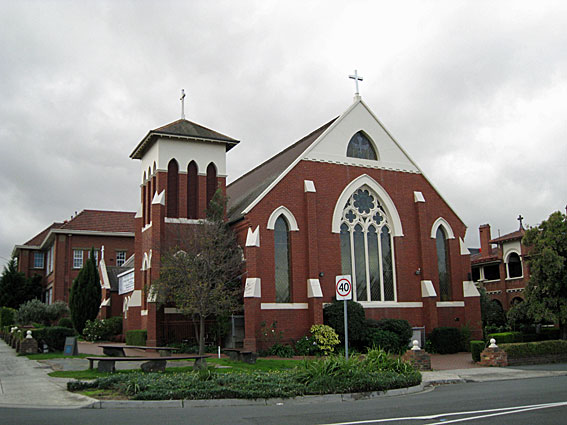
St Mary's Catholic Church, Thornbury
[Photograph by Geoffrey Cox (2012)]

St Mary's Catholic Church, Thornbury
[Photograph by Geoffrey Cox (2012)]
Historical and Technical Documentation by Geoffrey Cox
© OHTA 2014 (last updated March 2014)
St Mary's Catholic Church was opened and blessed by Archbishop T.J. Carr on 20 February 1916, having been built to the design of the architect, G.W. Vanheems of Melbourne. Originally attached to St Joseph's Parish, Northcote, and dedicated to Our Lady of Lourdes, St Mary's became an independent parish in 1923.1
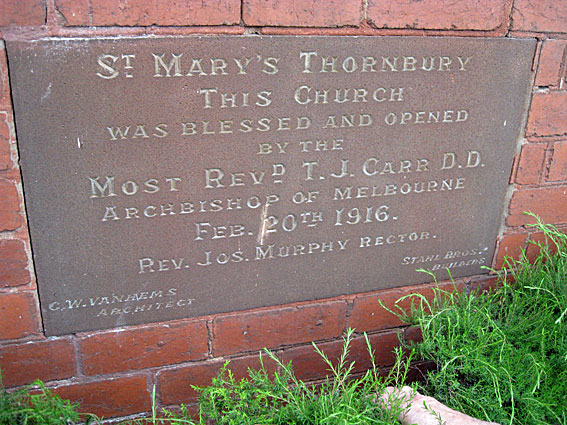
Stone commemorating the opening and blessing of the church
[Photograph by Geoffrey Cox (March 2014)]
The organ was supplied in 1942 by Hill, Norman & Beard (Aust.) Pty Ltd, and is listed as Order number V.159 – a three-rank extension organ for Our Lady of Lourdes, Thornbury.2 It was possibly one of the standard designs by Hill, Norman & Beard for extension organs at the time. There is a similar instrument at the Brotchie Memorial Presbyterian Church, Beecroft, NSW.
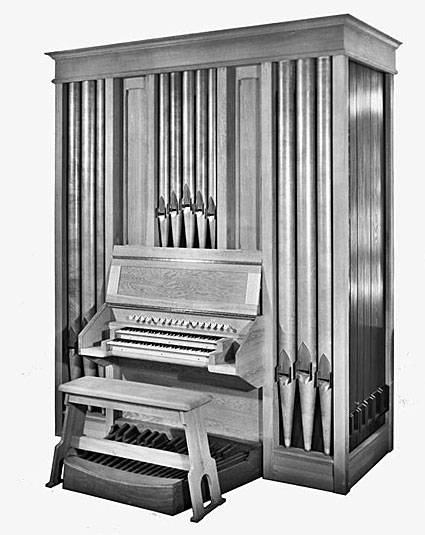
Unidentified Hill, Norman & Beard organ, c.1930s
[Photograph from the Harold Paynting Collection, State Library of Victoria
cited by John Maidment at http://trove.nla.gov.au/version/181961917]
Originally located in the gallery, it was moved to a position on the north side of the nave around 1988 by John Parker of Melbourne.3 Parker appears to have added some non-speaking façade pipes and also a Mixture (Acuta II) to the Great, visible above the façade pipes. He may also have altered the configuration of the borrowing. The console was detached and placed near the Sanctuary, at some distance from the organ itself on the north side of the church.

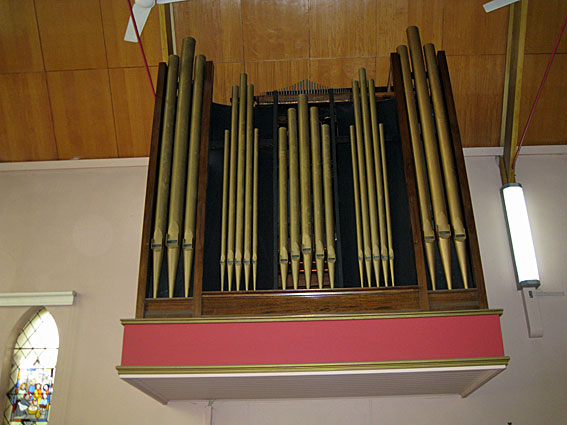
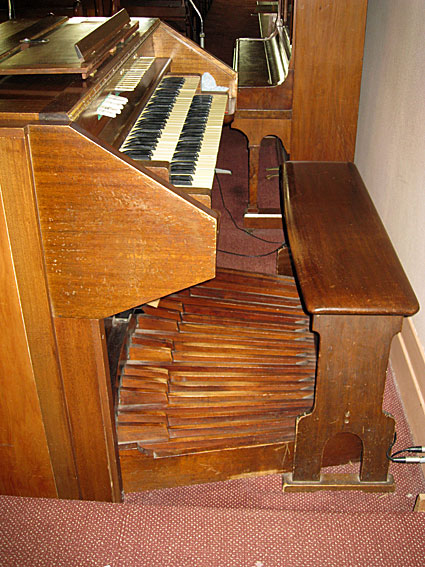
The organ and console as they existed before 2013
[Photographs by Geoffrey Cox (2012)]
The specification immediately before 2013 was as follows:
| Great Bourdon Open Diapason Salicional Claribel Octave Nazard Fifteenth Acuta Swell Viola Hohl Flute Octave Viola Flute Octave Piccolo Octavin Pedal Bourdon Stopped Diapason Choral Bass Quint Couplers I-Ped II-Ped I-II |
16 8 8 8 4 2-2/3 2 II 8 8 4 4 2 2 1 16 8 4 1-1/3 |
A B C A B A B C A C A C A A A A B A |
[c.1988] |
Tremulant
Electro-pneumatic action
Compass: 61/30
Detached stop-key console
Balanced swell pedal (electrically operated)
Radiating concave pedalboard.4
The organ was rebuilt, enlarged and re-located in divided cases above the narthex in 2013 by Australian Pipe Organs Pty Ltd of Keysborough, Vic. The Great and Pedal pipework are contained in the left-hand case, while the Swell pipework is in the right-hand case. A second blower was supplied to serve the Great and Pedal pipework. The new casework, constructed in Canadian Walnut, was designed by David Fincham in collaboration with Daniel Bittner of Australian Pipe Organs and Paolo Pianezze, the church architect. The existing speaking façade pipes were retained, supplemented with additional pipes provided to complete the expanded case design.
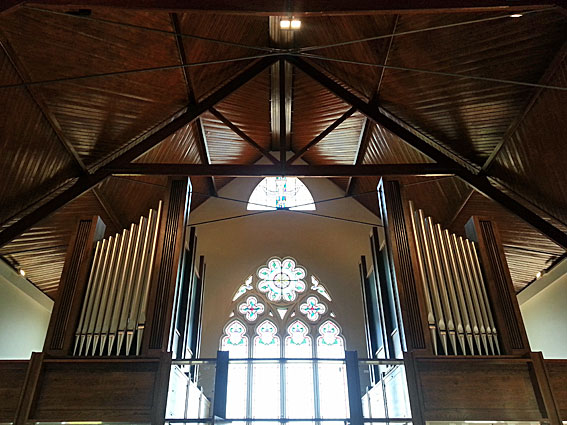

The rebuilt and enlarged organ
[Photographs by Daniel Bittner, Australian Pipe Organs Pty Ltd (December 2013)]
Several ranks were added to reduce the amount of borrowing, and to increase the independence of the Swell and Great. A new solid-state switching system was installed, and the existing swell box was extended to contain additional pipework. A reconditioned second-hand roll-top console, originally from St Joseph's Church, Edgecliffe, Sydney, was supplied and fitted with the existing keyboards, pedalboard and stool.5


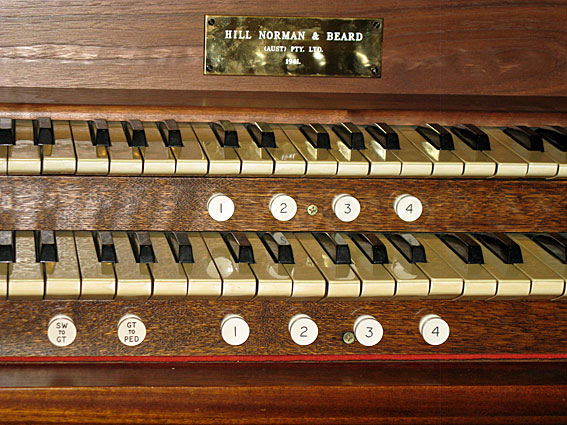
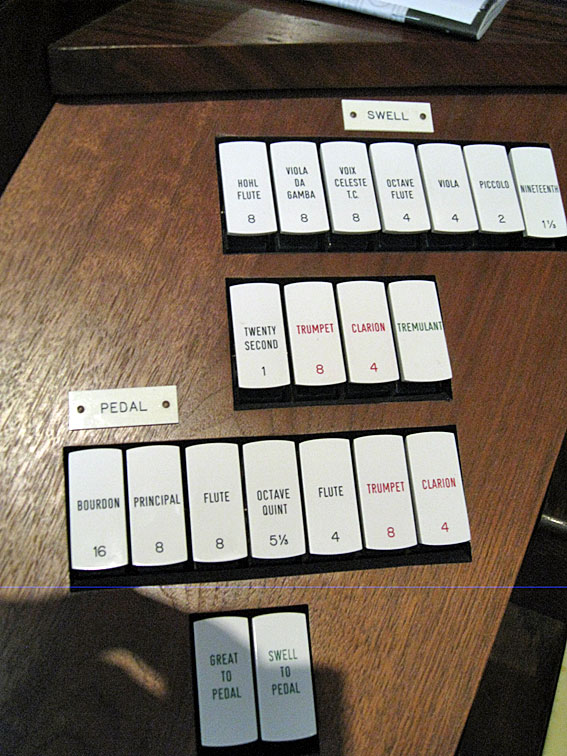
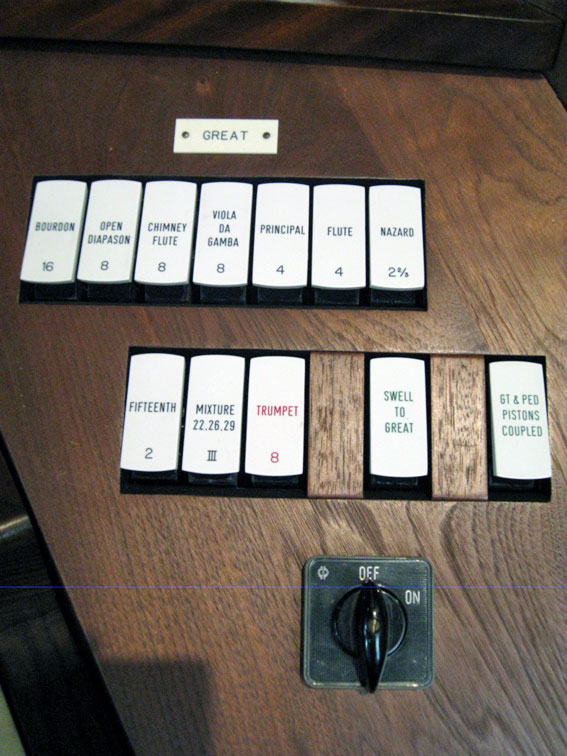
The console and console details
[Photographs by Geoffrey Cox (March 2014)]
| Great Bourdon Open Diapason Chimney Flute Viola da Gamba Principal Flute Nazard Fifteenth Mixture [22.26.29] Trumpet Swell Hohl Flute Viola da Gamba Voix Celeste T.C. Octave Flute Viola Piccolo Nineteenth Twenty Second Trumpet Clarion Pedal Bourdon Principal Flute Octave Quint Flute Trumpet Clarion Couplers Swell to Great Swell to Pedal Great to Pedal |
16 8 8 8 4 4 2-2/3 2 III 8 8 8 8 4 4 2 1-1/3 1 8 4 16 8 8 5-1/3 4 8 4 |
A B A C D A A D E F C F C F + C C C E E A B A A A E E |
[bottom octave from old rank = F] [2013] [2013] [2013] [2013] [2013] [former Acuta expanded] [2013] [2013] [2013] [2013] [bottom octave from old rank = F] [2013] [2013] [2013] [2013] [2013] |
[Swell] Tremulant
Electro-pneumatic action
Compass: 61/30
Detached rocker-tab console
Balanced swell pedal (eight-stage electrically operated)
Radiating concave pedalboard
4 adjustable thumb pistons to Great
4 adjustable thumb pistons to Swell
4 adjustable combinations to Pedal
Great and Pedal Pistons coupled
Great to Pedal reversible thumb piston
Swell to Great reversible thumb piston
General Cancel thumb piston.6
1 Personal communication to Geoffrey Cox from Fr. Gerry Medici, March 2014; The architect's name is misspelt on the commemorative stone pictured here.
2 'Hill, Norman & Beard Australian Orders,' OHTA News, vol. 12, no. 2 (April 1988), p. 17. The reconstructed plate on the present console gives the date as 1941.
3 Personal communication to Geoffrey Cox from Fr. Gerry Medici, 2012.
4 Specification noted by Geoffrey Cox, 2012.
5 Details from contract (late 2012) between Australian Pipe Organs Pty Ltd and St Mary's Church, Thornbury, and personal communication to Geoffrey Cox from Robert Heatley, March 2014.
6 Specification noted by Geoffrey Cox, March 2014.